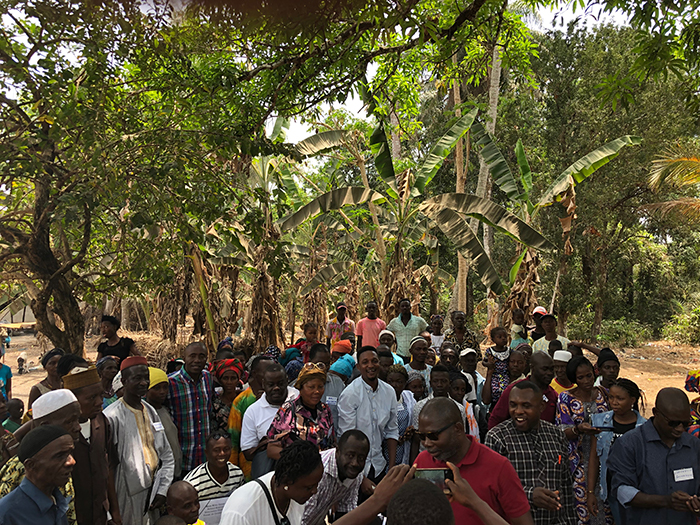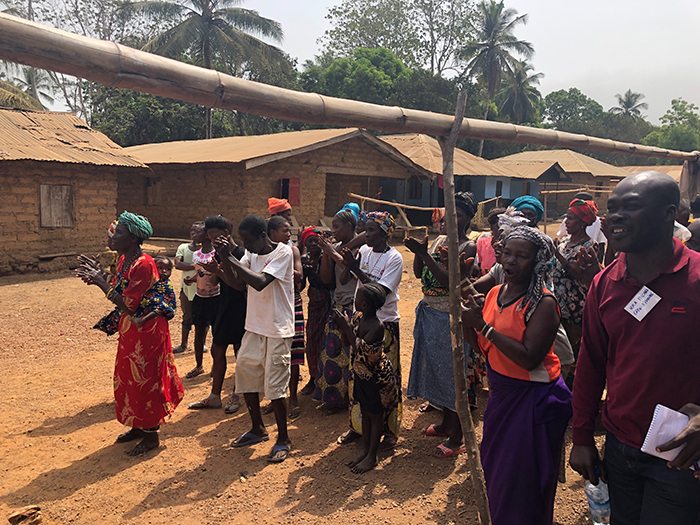This article was published more than 5 years ago.

Imagine living in a village where a mining company usurps control of your community’s land, threatening your family’s access to food, education, housing, farms, clean air and water, and disrupting your livelihoods. Instead of the promised development and economic gains it leads to further local impoverishment.
In response, your community mobilizes to discuss how you can defend your rights to your land and livelihood. But facing a big company that has the backing of the state, you often feel isolated and overwhelmed. Then comes an opportunity for you to connect with other leaders and lawyers pushing back against similar actions across the region. But your struggle against a corporation with immense resources and government support is just the start.
Intimidation, repression and killings – a familiar story
After months of protests and legal action, it feels like you’re making headway. Then one day, heavily-armed security forces camp at the protest site outside your village. The local governor mentions your activism in a speech as “anti-development.” And members from your community are arrested, subjected to violence, or threatened with death after speaking about your group’s efforts on a local radio program.
This is the story of many rural communities in resource-rich West Africa, where exploitation, corruption, and environmental and human rights abuses are often the norm. Unfortunately, governments are often complicit in corporate land grabs or fail to protect the rights of their citizens. Local chiefs are coerced or bribed into making decisions over community lands without consent or consultation among their communities. And local activists, groups, and residents who speak out have faced intimidation, physical threats, illegal detention, and killings.
For more than 15 years, the Fund for Global Human Rights has supported West African activists determined to preserve the physical, environmental, and economic health of their communities. In March 2019, with support from the Fund, more than 50 community leaders, legal professionals, and NGO representatives from eight countries gathered to discuss the effects of mining and land grabs and ways of working together to strengthen the movement in the region.

A shared space to build the movement
The event was organized by the Mano River Region Natural Resources Civil Society Platform, a network of local organizations across West Africa working with communities to hold governments and corporations accountable for environmental and human rights abuses linked to land and natural resource exploitation. One of its founders and leading advocate Alfred Brownell also founded Fund grantee Green Advocates. In 2019, he was awarded the Goldman Environmental Prize for his extraordinary environmental justice work in Liberia.
The convening provided an invigorating, trust-filled space for people from affected communities to share ideas and learn from each other’s experiences; for some, it was the first time they had the opportunity to meet activists from other countries. Sessions included workshops addressing the disproportionate impact on women, as well as the greater challenges they face around securing land rights. (Nearly half of attendees were women.)
They also took part in sessions including security awareness and risk management, how to identify and engage with hidden actors behind the decisions that fuel land and resource exploitation, and explorations of different local and international mechanisms to hold corporations accountable.
Solidarity, self-care and sustainability
In addition to challenges, participants highlighted positive stories where community organizing and action compelled some companies to enter into a dialogue, such as how one group’s efforts forced a palm oil company in Liberia to recognize a community’s customary land rights and pay compensation for destruction of sacred sites.
Participants developed an action plan and follow-up strategies, including strengthening platforms to amplify their work and mobilize new supporters, establishing legal empowerment programs, and advocating for stronger national policies and accountability mechanisms.
Because their work comes with tremendous risks, these courageous leaders also welcomed having time to connect with peers and find respite. (In one community alone, two activists were killed and 15 were arrested in the months prior to the event.) This solidarity and self-care within human rights movements are vital supports that enable community leaders’ well-being and success.
“If we are united and not focused on self-interest, nothing can stop us.”
A participant in the Mano River Region Natural Resources Civil Society Platform Convening.
Convenings such as these compose a core part of the Fund’s comprehensive approach to providing bold, agile human rights activists with the tools and resources they need to propel their work forward while ensuring the voices of the affected communities are at the forefront. These participants gained a toolkit of new skills and strategies to ensure their communities’ rights are respected, as well as greater credibility as the voice of corporate accountability campaigns in their respective countries. They also developed a robust community-led regional action plan which will require further resourcing.
Although the struggle may appear to be uphill, a united community advocating for themselves, in partnership with others, can produce powerful results—sustainable development that encompasses peace, dignity, justice, and equality for all. As one participant from Liberia shared, “Our leaders are looking at money and are self-interested. If we are united and not focused on self-interest, then nothing can stop us.”
John Kabia is the Fund’s program officer for thematic initiatives. Sushil Raj is a global philanthropy strategist.


